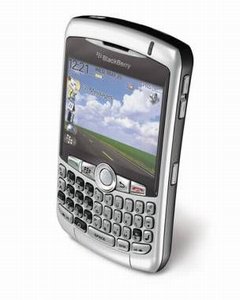 In January, I made the switch from an unlimited data plan to email only. This means I no longer have access to T-Mobile internet.
In January, I made the switch from an unlimited data plan to email only. This means I no longer have access to T-Mobile internet.
I had the unlimited data plan for two years (service is a little slow, but still convenient), but I’m happy to report I’m doing fine, saving a little money, and likely to father fewer Blackberry orphans as a result of my downgrade.
What’s more, my trusty Curve supports Wi-Fi, so if I really need access to the internet on my phone while not at home, it’s not that difficult to find a public connection.
For as technologically inclined as I am, it’s ironic how technology averse I can be, in an effort to maintain some level of privacy and social sanity. Do you ever feel the same?
I don’t know where I came up with this, but I’m sure it was from someone smarter than me. When successfully connecting with someone on the phone after first leaving a voicemail and/or email, don’t ask the person if they “got your message.” It does you no good and merely wastes an additional minute or two before getting to the real purpose for the call, to solve a problem.
I’ve started implementing this policy and can say it works wonders. I simply say “Hello,” after the person answers and proceed to ask my original question assuming they didn’t get my message. This speeds things up and gets you your information quicker than the usual. Who cares if they got your message, what matters is that you get your answer.
There is a plethora of business books out in the world claiming to reveal the next big thing to make money or better run your business. Some are good, most are bad. There are books on management, sales, and even customer service. The last one I think is laughable. Customer service is equivalent to how you cordially serve your customers to make them happy. If you don’t understand that, I don’t know how you would be in business.
I therefore present Griffio’s “corporate policy” on customer service. It’s rather simple and is based on one thing: accountability. Be responsive to those you interact with. Here’s how:
-
Return phone calls within 1.5 hours – it’s tough, but it can be done. You will be surprised how comforting a returned phone call can be to your customers. By your doing it, they will have more respect for you and your company.
-
Reply to emails on the same day – When someone writes an email, respond to it. It usually takes about 10 seconds to do so. I recently emailed a gentleman last week inquiring about his marketing services. I still haven’t heard from him. My bet is that if he treats his potential customer’s poorly, a paying customer probably won’t get much response from him either.
Reason being: customer service is about character not dollars. It’s something that is hard to teach although it can be done. The two above items should help your efforts in showing your customers that you care enough to respond to them. They have been the only formal customer service policies we follow and have taken our company a long way in being one of the most responsive firms in our industry. Sure beats reading a long, boring business book on customer service.
 In January, I made the switch from an unlimited data plan to email only. This means I no longer have access to T-Mobile internet.
In January, I made the switch from an unlimited data plan to email only. This means I no longer have access to T-Mobile internet.